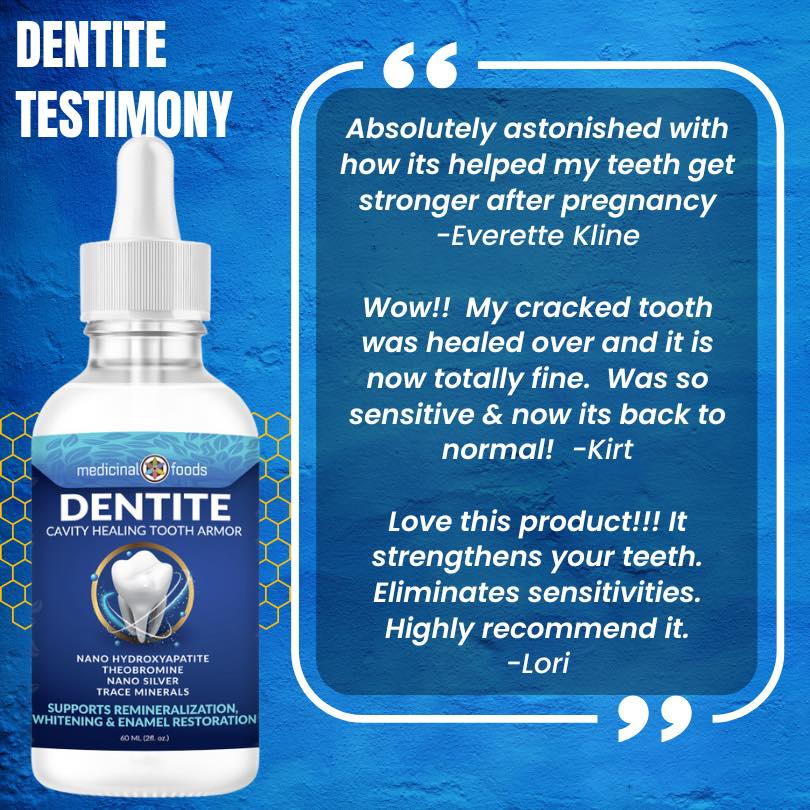Bruxism and Tooth Sensitivity: Why Grinding Destroys Enamel and How to Fix It
If you wake up with sore jaws, headaches, or teeth that feel sensitive the second you sip coffee, there’s a good chance you’re grinding your teeth at night. This habit—called bruxism—is one of the most destructive forces on enamel. Unlike sipping soda or eating citrus, which erode enamel slowly over years, grinding can wear it down dramatically in months.
The worst part? Most people don’t even realize they’re doing it until the damage is obvious. Tooth edges flatten, enamel thins, and sensitivity spikes. Left unchecked, bruxism doesn’t just make your teeth hurt—it sets you up for cracks, chips, and a lifetime of dental repairs.
But here’s the key: grinding is ongoing. You can’t “cure” bruxism with a mouthguard alone. Every night, the grinding continues. That means you need a solution that doesn’t just mask the problem, but continuously repairs the damage being done.
That’s where Dentite comes in.
Why Bruxism Is So Hard on Enamel
Tooth enamel is tough—the hardest substance in your body. But it isn’t indestructible. When you grind, you’re pressing teeth against each other with a force far greater than chewing. Over time, this constant mechanical stress:
- Wears enamel thin—exposing the dentin layer underneath, which is full of nerve pathways.
- Creates microcracks—tiny fractures that make teeth extra vulnerable to pain.
- Flattens cusps—the pointed surfaces designed for chewing, leading to sensitivity when pressure hits flat surfaces.
- Accelerates erosion—grinding doesn’t just weaken enamel; it makes acids and whitening agents more destructive because the surface is already compromised.
In short: bruxism is a sensitivity amplifier. If you grind, every other trigger (cold water, hot coffee, whitening, acid) is magnified.
The Signs You’re Grinding
Because grinding often happens while you sleep, you may not notice it directly. Instead, you see and feel the consequences:
- Jaw tightness or soreness in the morning.
- Headaches that start after waking.
- Teeth that look worn or shortened.
- Sensitivity that seems to get worse over time.
- Chipping or cracking at the edges of teeth.
Dentists can usually spot bruxism right away by looking at wear patterns. But if you’re experiencing the above, there’s a good chance you’re grinding more than you realize.
Why Sensitive Toothpaste Won’t Cut It
When sensitivity shows up, most people reach for sensitive toothpaste. And while these pastes may dull the pain temporarily, they don’t address the core problem.
Here’s why:
- Bruxism is ongoing. Every night you grind, new damage is created.
- Toothpastes use too little active ingredient. The nano-hydroxyapatite in sensitive pastes isn’t dosed high enough to repair cracks and rebuild enamel.
- They mask, not mend. At best, they block nerve signals; once you stop, the pain returns.
You can’t outpace nightly enamel destruction with a morning brush. You need something stronger, designed to restore enamel at the structural level.
How Dentite Helps Bruxism-Related Sensitivity
Dentite isn’t a toothpaste. It’s a dedicated enamel restoration treatment with a clinically effective dose of nano-hydroxyapatite—the mineral your enamel is made of.
For people with bruxism, that means:
- Continuous repair. Every time you use Dentite, you’re replenishing the enamel that grinding wears down.
- Tubule sealing. Repairing enamel blocks the pathways to nerves.
- Strength against future grinding. Stronger enamel doesn’t stop grinding, but it minimizes the pain and damage it causes.
Think of it like patching potholes on a road. If the cars keep driving, damage keeps happening—but if you repair the holes regularly, the road stays functional. Dentite does the same thing for your enamel.
Mouthguards Help, But They’re Not Enough
Many dentists recommend night guards for bruxism. And they do help by cushioning force and preventing enamel-on-enamel wear. But they don’t repair damage.
A night guard is like putting a helmet on—it prevents the worst damage, but the stress still happens underneath. Without restoring enamel, the sensitivity keeps coming back.
That’s why Dentite plus a guard is the best combination: protection plus repair.
Daily Habits That Make Bruxism Sensitivity Worse
Bruxism is bad enough on its own. Layer in a few common habits, and the sensitivity multiplies:
- Whitening too often. Grinding + whitening = enamel disaster.
- Drinking acidic beverages daily. Weak enamel can’t handle the double hit.
- Brushing aggressively. Scrubbing worn enamel thins it further.
- Skipping hydration. Dry mouth overnight (from mouth breathing or alcohol) worsens the damage.
If you grind, Dentite should be non-negotiable—because you’re starting every day in an enamel deficit.
The Bigger Picture
Bruxism isn’t going away. Stress, sleep issues, and daily habits mean grinding will always be part of the equation for many people. You can wear a night guard, but that only reduces surface wear.
If you want lasting relief from sensitivity, you need to repair the damage as it happens. Dentite is uniquely positioned as the solution for bruxism-related sensitivity—because it works continuously to restore enamel, rebuild strength, and cut off the pain at its source.
Final Thought
Grinding is one of the fastest ways to destroy enamel and create sensitivity. Unlike acid erosion, which creeps up slowly, or whitening, which comes in bursts, bruxism is nightly, ongoing damage. That means the solution can’t just be a one-time fix.
Dentite provides continuous repair—the daily reinforcement your enamel needs to keep up with the stress of grinding. With Dentite, you can live with bruxism without living in pain.










